Communication Skills
21 Pages5674 Words41 Views
Added on 2023-02-03
About This Document
This document discusses the top 10 communication skills that recruiters and hiring managers look for, including listening, nonverbal communication, clarity and concision, friendliness, confidence, empathy, open-mindedness, respect, feedback, and choosing the right medium. It also explores the barriers to effective communication within organizations, such as language differences, prejudice, cultural differences, and technical language. Additionally, it discusses the different modes of communication used in organizations, including verbal, written, and electronic communication. Finally, it assesses how organizations portray themselves through their communication and evaluates the image of SHDE Holdings and other organizations.
Communication Skills
Added on 2023-02-03
ShareRelated Documents
Communication Skills
Student Name: ROBERT CONSTANTIN CONSTANTIN
Level 4
Student Name: ROBERT CONSTANTIN CONSTANTIN
Level 4
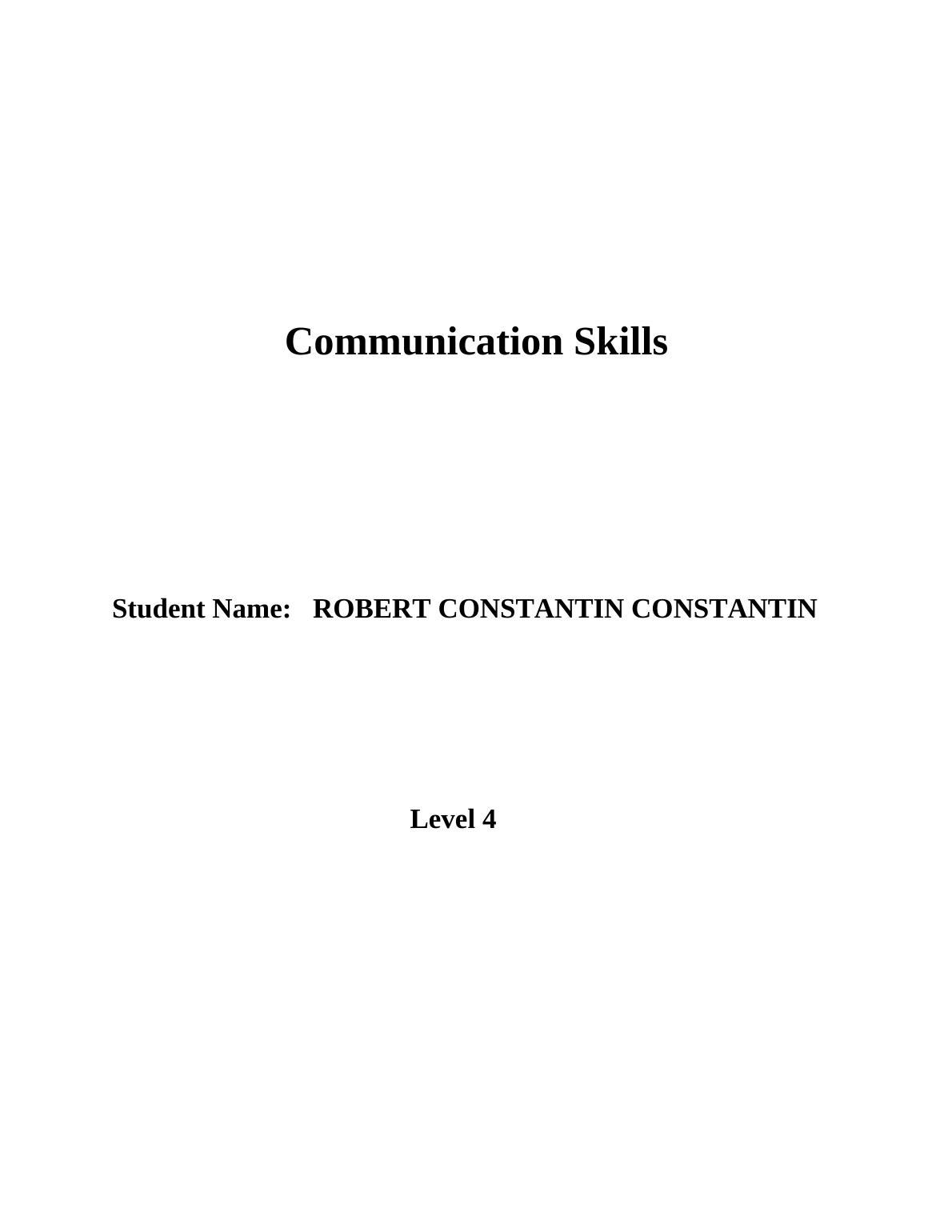
Table of Contents
The process of communication (AC 1.1)
Why communication within organizations is sometimes not effective (AC1.3)..................6
How organisations portray themselves through their communication. What image does SHDE
Holdings currently have? Give an assessment of other organisations and the images they portray
through their communications (AC 2.3)...
Explain formal communications systems that should be used to communicate with customers.
Please evaluate different systems. (AC 2.1)...........................................................
Conduct an analysis of the effectiveness of social media to communicate with customers. Please
use current examples (AC 2.3...........................................................................
An assessment of the impact of personal relationships on communications (AC 3.1)
An assessment of impact of non-verbal communication on oral communications (AC 3.2)
Assess the effectiveness of your oral presentation skills (AC 4.4)
Review your written communication (AC 5.4) including the conventions you have used (AC 3.4)
Assess the impact of technology on oral and written communication (3.3)
Following our discussions I wish you to produce written documentation from this meeting (AC
5.2)
References.................................................................................................21
The process of communication (AC 1.1)
Why communication within organizations is sometimes not effective (AC1.3)..................6
How organisations portray themselves through their communication. What image does SHDE
Holdings currently have? Give an assessment of other organisations and the images they portray
through their communications (AC 2.3)...
Explain formal communications systems that should be used to communicate with customers.
Please evaluate different systems. (AC 2.1)...........................................................
Conduct an analysis of the effectiveness of social media to communicate with customers. Please
use current examples (AC 2.3...........................................................................
An assessment of the impact of personal relationships on communications (AC 3.1)
An assessment of impact of non-verbal communication on oral communications (AC 3.2)
Assess the effectiveness of your oral presentation skills (AC 4.4)
Review your written communication (AC 5.4) including the conventions you have used (AC 3.4)
Assess the impact of technology on oral and written communication (3.3)
Following our discussions I wish you to produce written documentation from this meeting (AC
5.2)
References.................................................................................................21
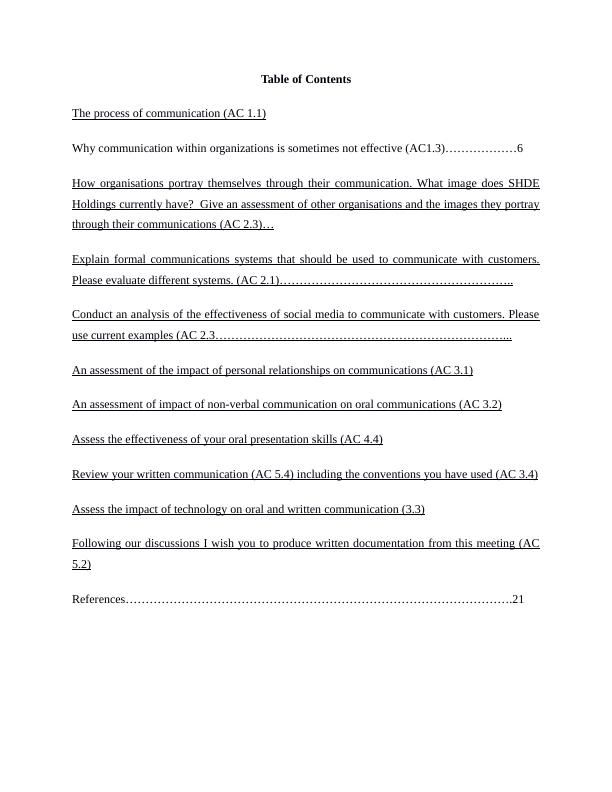
The process of communication (AC 1.1)
These are the top 10 communication skills that recruiters and hiring managers want to see on
your resume and cover letter. Highlight these skills and demonstrate them during job interviews,
and you’ll make a solid first impression. Continue to develop these skills once you’re hired, and
you’ll impress your boss, teammates, and clients.
1. Listening
Being a good listener is one of the best ways to be a good communicator. No one likes
communicating with someone who only cares about putting in her two cents and does not take
the time to listen to the other person. If you're not a good listener, it's going to be hard to
comprehend what you're being asked to do.
Take the time to practice active listening. Active listening involves paying close attention to what
the other person is saying, asking clarifying questions, and rephrasing what the person says to
ensure understanding ("So, what you're saying is...").
Through active listening, you can better understand what the other person is trying to say, and
can respond appropriately.
2. Nonverbal Communication
Your body language, eye contact, hand gestures, and tone all color the message you are trying to
convey. A relaxed, open stance (arms open, legs relaxed), and a friendly tone will make you
appear approachable and will encourage others to speak openly with you.
Eye contact is also important; you want to look the person in the eye to demonstrate that you are
focused on the person and the conversation (however, be sure not to stare at the person, which
can make him or her uncomfortable).
Also, pay attention to other people's nonverbal signals while you are talking.
These are the top 10 communication skills that recruiters and hiring managers want to see on
your resume and cover letter. Highlight these skills and demonstrate them during job interviews,
and you’ll make a solid first impression. Continue to develop these skills once you’re hired, and
you’ll impress your boss, teammates, and clients.
1. Listening
Being a good listener is one of the best ways to be a good communicator. No one likes
communicating with someone who only cares about putting in her two cents and does not take
the time to listen to the other person. If you're not a good listener, it's going to be hard to
comprehend what you're being asked to do.
Take the time to practice active listening. Active listening involves paying close attention to what
the other person is saying, asking clarifying questions, and rephrasing what the person says to
ensure understanding ("So, what you're saying is...").
Through active listening, you can better understand what the other person is trying to say, and
can respond appropriately.
2. Nonverbal Communication
Your body language, eye contact, hand gestures, and tone all color the message you are trying to
convey. A relaxed, open stance (arms open, legs relaxed), and a friendly tone will make you
appear approachable and will encourage others to speak openly with you.
Eye contact is also important; you want to look the person in the eye to demonstrate that you are
focused on the person and the conversation (however, be sure not to stare at the person, which
can make him or her uncomfortable).
Also, pay attention to other people's nonverbal signals while you are talking.
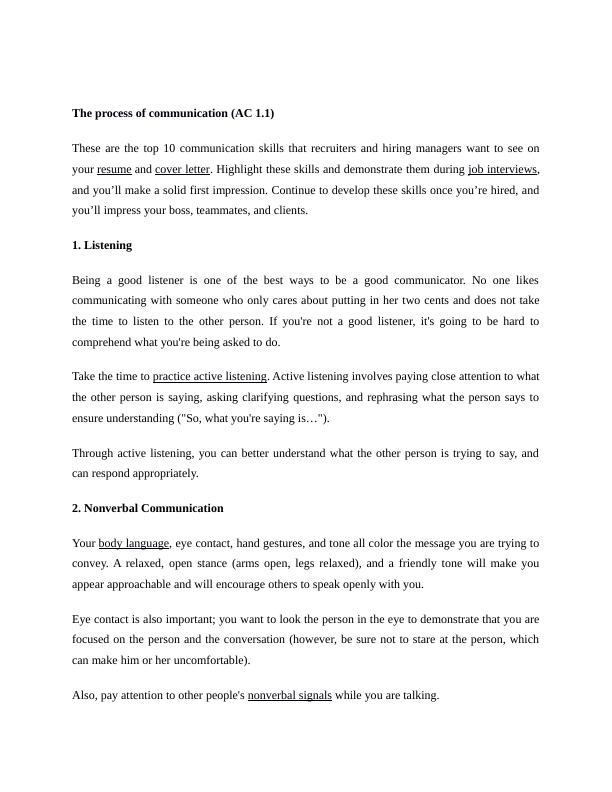
Often, nonverbal signals convey how a person is really feeling. For example, if the person is not
looking you in the eye, he or she might be uncomfortable or hiding the truth.
3. Clarity and Concision
Good communication means saying just enough – don’t talk too much or too little. Try to convey
your message in as few words as possible. Say what you want clearly and directly, whether
you're speaking to someone in person, on the phone, or via email. If you ramble on, your listener
will either tune you out or will be unsure of exactly what you want. Think about what you want
to say before you say it; this will help you to avoid talking excessively and/or confusing your
audience.
4. Friendliness
Through a friendly tone, a personal question, or simply a smile, you will encourage your
coworkers to engage in open and honest communication with you. It's important to be nice and
polite in all your workplace communications.
This is important in both face-to-face and written communication. When you can, personalize
your emails to coworkers and/or employees – a quick "I hope you all had a good weekend" at the
start of an email can personalize a message and make the recipient feel more appreciated.
5. Confidence
It is important to be confident in your interactions with others. Confidence shows your
coworkers that you believe in what you’re saying and will follow through. Exuding confidence
can be as simple as making eye contact or using a firm but friendly tone. Avoid making
statements sound like questions. Of course, be careful not to sound arrogant or aggressive. Be
sure you are always listening to and empathizing with the other person.
6. Empathy
Even when you disagree with an employer, coworker, or employee, it is important for you to
understand and respect their point of view.
looking you in the eye, he or she might be uncomfortable or hiding the truth.
3. Clarity and Concision
Good communication means saying just enough – don’t talk too much or too little. Try to convey
your message in as few words as possible. Say what you want clearly and directly, whether
you're speaking to someone in person, on the phone, or via email. If you ramble on, your listener
will either tune you out or will be unsure of exactly what you want. Think about what you want
to say before you say it; this will help you to avoid talking excessively and/or confusing your
audience.
4. Friendliness
Through a friendly tone, a personal question, or simply a smile, you will encourage your
coworkers to engage in open and honest communication with you. It's important to be nice and
polite in all your workplace communications.
This is important in both face-to-face and written communication. When you can, personalize
your emails to coworkers and/or employees – a quick "I hope you all had a good weekend" at the
start of an email can personalize a message and make the recipient feel more appreciated.
5. Confidence
It is important to be confident in your interactions with others. Confidence shows your
coworkers that you believe in what you’re saying and will follow through. Exuding confidence
can be as simple as making eye contact or using a firm but friendly tone. Avoid making
statements sound like questions. Of course, be careful not to sound arrogant or aggressive. Be
sure you are always listening to and empathizing with the other person.
6. Empathy
Even when you disagree with an employer, coworker, or employee, it is important for you to
understand and respect their point of view.
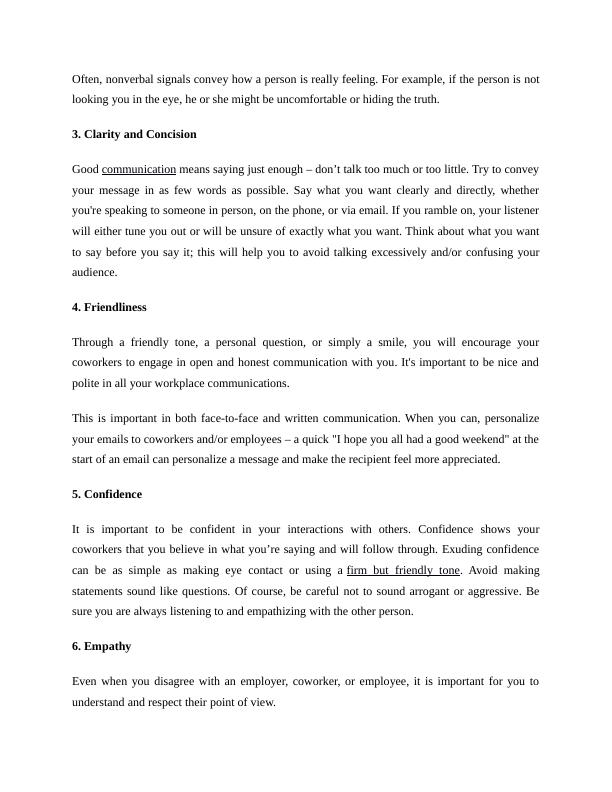
Using phrases as simple as "I understand where you are coming from" demonstrate that you have
been listening to the other person and respect their opinions.
7. Open-Mindedness
A good communicator should enter any conversation with a flexible, open mind. Be open to
listening to and understanding the other person's point of view, rather than simply getting your
message across. By being willing to enter into a dialogue, even with people with whom you
disagree, you will be able to have more honest, productive conversations.
8. Respect
People will be more open to communicating with you if you convey respect for them and their
ideas. Simple actions like using a person's name, making eye contact, and actively listening when
a person speaks will make the person feel appreciated. On the phone, avoid distractions and stay
focused on the conversation.
Convey respect through email by taking the time to edit your message. If you send a sloppily
written, confusing email, the recipient will think you do not respect her enough to think through
your communication with her.
9. Feedback
Being able to appropriately give and receive feedback is an important communication skill.
Managers and supervisors should continuously look for ways to provide employees with
constructive feedback, be it through email, phone calls, or weekly status updates. Giving
feedback involves giving praise as well – something as simple as saying "good job" or "thanks
for taking care of that" to an employee can greatly increase motivation.
Similarly, you should be able to accept and even encourage, feedback from others. Listen to the
feedback you are given, ask clarifying questions if you are unsure of the issue, and make efforts
to implement the feedback.
been listening to the other person and respect their opinions.
7. Open-Mindedness
A good communicator should enter any conversation with a flexible, open mind. Be open to
listening to and understanding the other person's point of view, rather than simply getting your
message across. By being willing to enter into a dialogue, even with people with whom you
disagree, you will be able to have more honest, productive conversations.
8. Respect
People will be more open to communicating with you if you convey respect for them and their
ideas. Simple actions like using a person's name, making eye contact, and actively listening when
a person speaks will make the person feel appreciated. On the phone, avoid distractions and stay
focused on the conversation.
Convey respect through email by taking the time to edit your message. If you send a sloppily
written, confusing email, the recipient will think you do not respect her enough to think through
your communication with her.
9. Feedback
Being able to appropriately give and receive feedback is an important communication skill.
Managers and supervisors should continuously look for ways to provide employees with
constructive feedback, be it through email, phone calls, or weekly status updates. Giving
feedback involves giving praise as well – something as simple as saying "good job" or "thanks
for taking care of that" to an employee can greatly increase motivation.
Similarly, you should be able to accept and even encourage, feedback from others. Listen to the
feedback you are given, ask clarifying questions if you are unsure of the issue, and make efforts
to implement the feedback.
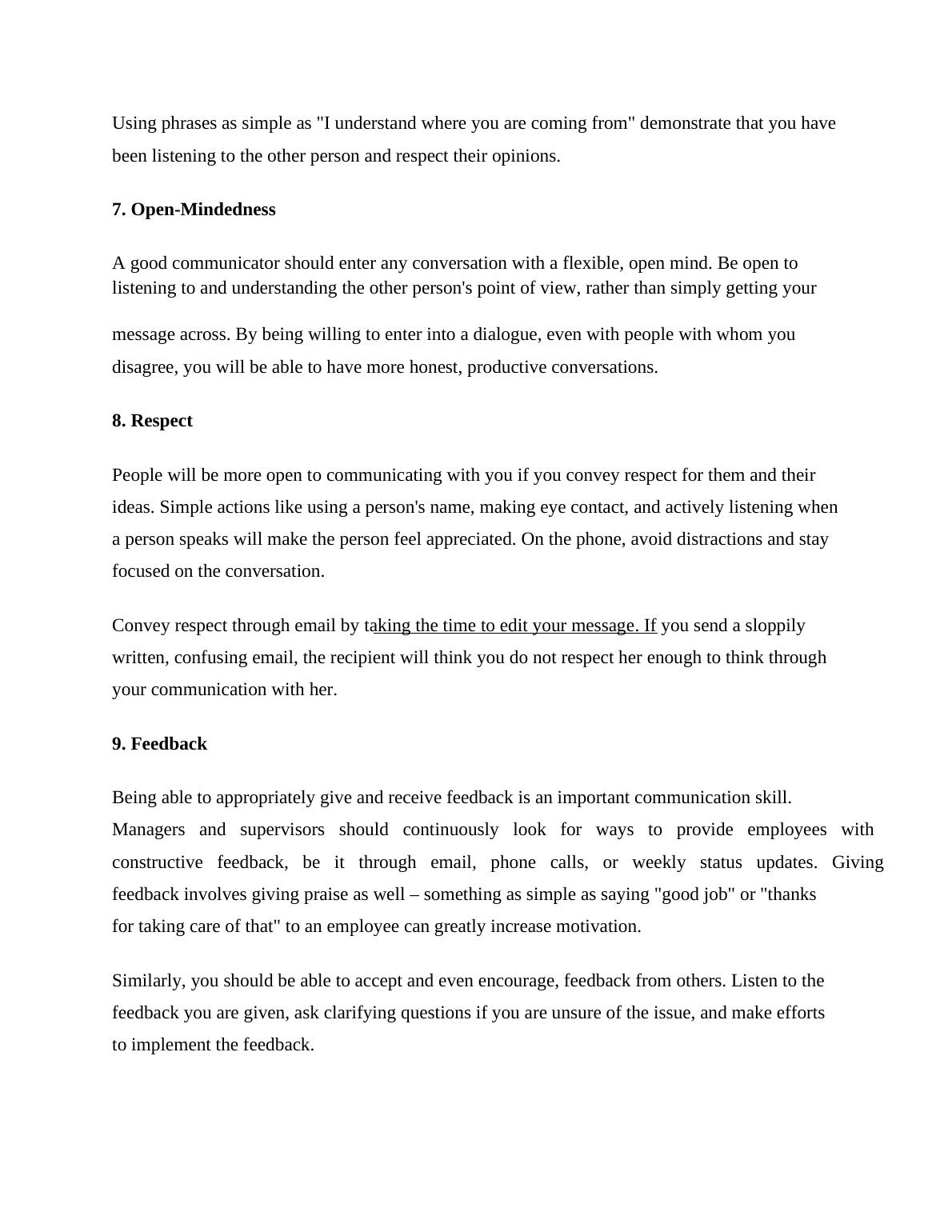
10. Picking the Right Medium
An important communication skill is to simply know what form of communication to use. For
example, some serious conversations (layoffs, changes in salary, etc.) are almost always best
done in person.
You should also think about the person with whom you wish to speak, if they are very busy
people (such as your boss, perhaps), you might want to convey your message through email.
People will appreciate your thoughtful means of communication and will be more likely to
respond positively to you.For best communication, four important elements play an important
role. They are sender, receiver, and channel and message (Dev and Don, 2005). Sender is the
individual or an entity that intends to communicate a message to other individual. For an
organization, the sender can be the public relations office or marketing that seeks to
communicate. Receiver is the person to whom the communication is targeted. Receiver, for an
organization, can be any of the stakeholders including customers, suppliers, local communities
and employees. Message is the content that is transferred by the sender to receiver. For example,
the organization sends promotional content which is in the form of information about the
services, products or brand of the organization. Finally, media refers to channels that carry the
message from the sender to receiver. Media for an organization could be an email, telephone,
newspaper, television and radio etc. The communication can be termed as successful only when
the intended message is rightly decoded by the receiver (Hutt and Speh, 2004). The failure of
communication takes place when the receiver understands the meaning of the message in a
different way which is not desired by the sender. In today’s business environment,
communication is influenced by factors such as availability of technology, sender’s skill sets,
cultural differences and language barriers etc.
Why communication within organizations is sometimes not effective (AC1.3)
The communication within the organization is not effective because of various kinds of barriers
mentioned below.
Language Differences – In this globalized environment, organizations are forced to send
business managers to foreign countries. If the business manager does not the native language of
An important communication skill is to simply know what form of communication to use. For
example, some serious conversations (layoffs, changes in salary, etc.) are almost always best
done in person.
You should also think about the person with whom you wish to speak, if they are very busy
people (such as your boss, perhaps), you might want to convey your message through email.
People will appreciate your thoughtful means of communication and will be more likely to
respond positively to you.For best communication, four important elements play an important
role. They are sender, receiver, and channel and message (Dev and Don, 2005). Sender is the
individual or an entity that intends to communicate a message to other individual. For an
organization, the sender can be the public relations office or marketing that seeks to
communicate. Receiver is the person to whom the communication is targeted. Receiver, for an
organization, can be any of the stakeholders including customers, suppliers, local communities
and employees. Message is the content that is transferred by the sender to receiver. For example,
the organization sends promotional content which is in the form of information about the
services, products or brand of the organization. Finally, media refers to channels that carry the
message from the sender to receiver. Media for an organization could be an email, telephone,
newspaper, television and radio etc. The communication can be termed as successful only when
the intended message is rightly decoded by the receiver (Hutt and Speh, 2004). The failure of
communication takes place when the receiver understands the meaning of the message in a
different way which is not desired by the sender. In today’s business environment,
communication is influenced by factors such as availability of technology, sender’s skill sets,
cultural differences and language barriers etc.
Why communication within organizations is sometimes not effective (AC1.3)
The communication within the organization is not effective because of various kinds of barriers
mentioned below.
Language Differences – In this globalized environment, organizations are forced to send
business managers to foreign countries. If the business manager does not the native language of
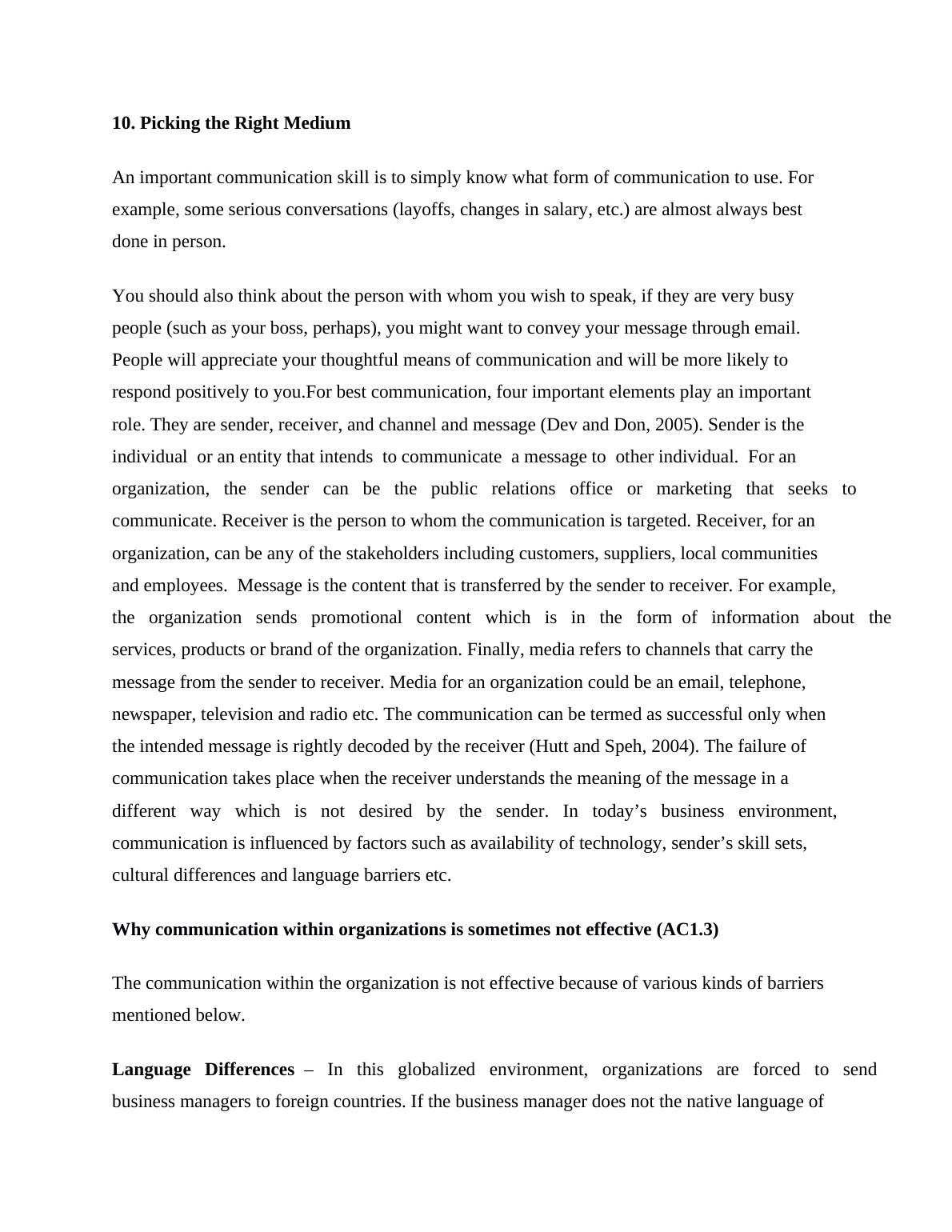
End of preview
Want to access all the pages? Upload your documents or become a member.
Related Documents
Importance of Communication Skills in the Workplacelg...
|6
|1430
|462
Reflective Account on Effective Communication Skills and Negotiation Skillslg...
|9
|2209
|28
Business communication (Doc)lg...
|7
|1443
|36
Non-Verbal Communicationlg...
|7
|1465
|478
Importance of Effective Communication Skills in Academics and Professional Careerslg...
|6
|1339
|23
(PDF) Understanding Self and Otherslg...
|11
|3153
|246
